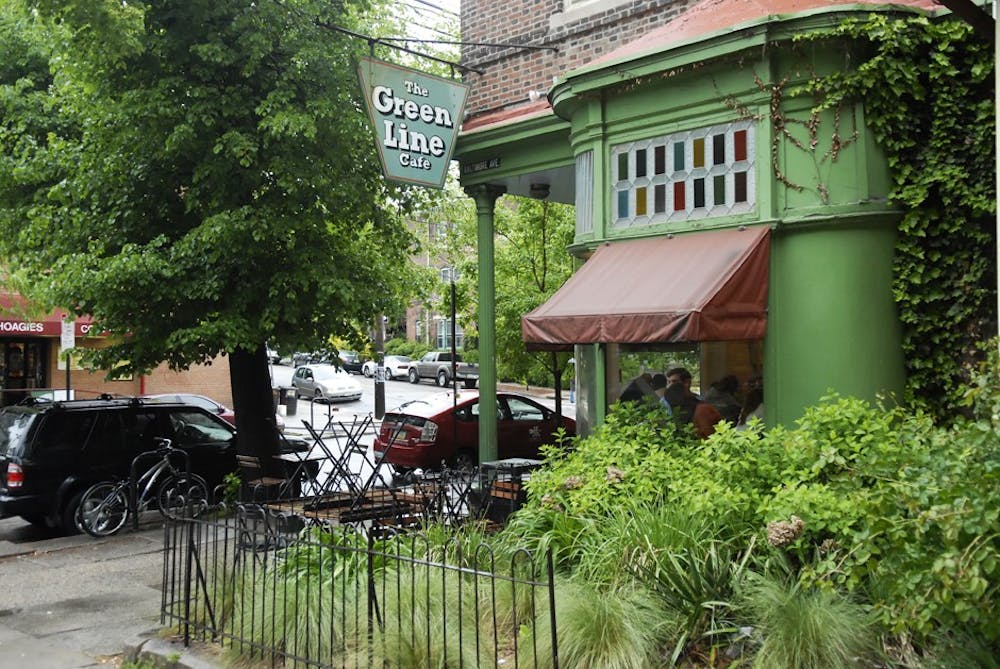
West Philadelphia has seen a growth in vegan dining at cafes, restaurants and even grocery stores — driven in part by student demand.
For vegans, who do not eat meat, dairy or other foods produced from animals, options near campus include White Dog Cafe, Hummus and Metropolitan Bakery.
Ed’s Buffalo Wings and Pizza and Cream and Sugar have also recently added vegan goods to their menus.
Growing diversity of vegan options follows positive feedback to local businesses who have embraced the increasingly popular diet.
More Vegan Dining
At Green Line Cafe, baked vegan goods sell quickly, according to Chef Mick Kalata.
A batch of 90 vegan cupcakes ordered from a specialty baker could easily sell out in three days, he said.
Green Line has always offered vegan foods, but in the last six to 12 months has tried to expand its options, Co-Owner Daniel Thut said.
Green Line’s customer base — which students make up roughly a quarter of — prompted the increase. The cafe is also experimenting with new types of vegan baked goods after getting a new prep kitchen, Thut said.
The cafe sells vegan chicken salads on a multigrain bagel and vegan chicken sandwiches, dubbed the “veggie party,” as well as vegan bagels and cream cheese.
“I would say that there is both an increase in the number of vegetarian restaurants and an increase in those catering to people choosing to be vegetarian,” University City District spokeswoman Lori Klein Brennan wrote in an e-mail.
Growth in veganism may reflect “changing eating habits” and the “movement of young people and young families into the neighborhood,” History professor Michael Katz wrote in an e-mail.
Organizations such as Penn Vegetarian Society and Peace Advocacy Network have been working with businesses to increase vegan options.
PVS President and College sophomore Victor Galli met with the owner of Ed’s every few weeks starting in January.
Previously, Penn vegans hankering for pizza had to trek out to Center City. Now they can order a “quick and dirty” treat direct to their door, Galli said.
According to Galli, the pizza — launched in March — has been so successful that the owner plans to expand vegan options to include strombolis, calzones, wraps and sandwiches.
Grocery stores have also taken to stocking their shelves for vegans.
A year ago, “I would have been hard-pressed to find anything in Fresh Grocer that had the word ‘vegan’ on it,” Galli said. Now there are entire sections dedicated to vegan or vegetarian products, selling vegan cheese, vegan frozen pizza, vegan cream cheese and even vegan frozen chicken nuggets.
Vegan on a Budget
“We are vegan because we are the biggest foodies,” Galli said, explaining that vegans care where their food comes from.
According to Bon Appetit’s annual survey of college students, less than one percent of students reported eating vegan in 2005. Now the figure has risen to two percent.
This is four times the national average of 0.5 percent, according to a 2008 survey by Vegetarian Times magazine.
Vegetarianism among students grew from eight to 12 percent.
Terri Brownlee, regional director of nutrition for Bon Appetit, said student interest in vegetarian and vegan diets has grown yearly.
Brownlee said students might be “equally divided” between health reasons and social-justice concerns.
Because there is more “activism” and “experimentation” in college, students may represent a slightly greater percentage of vegans than the general population, Brownlee said.
Wendy Born, owner of Metropolitan Bakery, has also noticed “a slight increase in demand for vegan products over the past three years, especially with folks under 25.”
“Being in college makes it a lot easier,” Penn Law alumna and President of Peace Advocacy Network Leila Fusfeld said. Summers and winter breaks, however, require dealing with potential differences in diet with one’s family, she explained.
Whereas justifications for veganism used to be based heavily in animal welfare, more Penn vegans are citing health as the main reason for their diet, Galli said.
“Penn students are receptive to the health values,” he said, including the negative effects dairy and meats may have on weight, skin and overall fitness.
Ten years ago, popular opinion might have linked veganism to “communists and hipsters and hippies,” Galli said. Now the movement has become “much more mainstream.”
A “Mecca”
Many vegans say they tend to explore the city more by nature of their interest in social issues and activism.
Students interested in food issues tend to be more interested in social justice that would put them into contact with the city, College freshman and PVC member Heather Gerrish said.
Although West Philadelphia has a “fast-food restaurant on every corner,” eateries in the area also cater to individuals seeking healthier foods or simply “good ethnic options,” Fusfeld said.
“Typically Ethiopian, Indian and some of the Asian cuisines are going to be pretty vegan-friendly,” she said.
Galli sees the growth in vegan dining as a vehicle to challenge dated and “romanticized” notions of West Philadelphia as dirty and unclean — “a ‘Fresh Prince of Bel-Air’ image” held by students who don’t know where Baltimore Avenue is, he said.
The area between 42nd and 50th streets on Baltimore, which he has nicknamed the “vegan mecca” of West Philadelphia, is “dramatically revamping,” he said.
Although veganism might constitute a “minor aspect” of neighborhood identity, it means more options exist for vegans, Kalata said.
The Daily Pennsylvanian is an independent, student-run newspaper. Please consider making a donation to support the coverage that shapes the University. Your generosity ensures a future of strong journalism at Penn.
DonatePlease note All comments are eligible for publication in The Daily Pennsylvanian.




